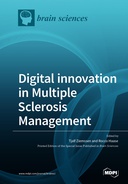Explore

Digital innovation in Multiple Sclerosis Management
0 Ungluers have
Faved this Work
Login to Fave
Due to innovation in technology, a new type of patient has been created, the e-patient, characterized by the use of electronic communication tools and commitment to participate in their own care. The extent to which the world of digital health has changed during the COVID-19 pandemic has been widely recognized. Remote medicine has become part of the new normal for patients and clinicians, introducing innovative care delivery models that are likely to endure even if the pendulum swings back to some degree in a post-COVID age. The development of digital applications and remote communication technologies for patients with multiple sclerosis has increased rapidly in recent years. For patients, eHealth apps have been shown to improve outcomes and increase access to care, disease information, and support. For HCPs, eHealth technology may facilitate the assessment of clinical disability, analysis of lab and imaging data, and remote monitoring of patient symptoms, adverse events, and outcomes. It may allow time optimization and more timely intervention than is possible with scheduled face-to-face visits. The way we measure the impact of MS on daily life has remained relatively unchanged for decades, and is heavily reliant on clinic visits that may only occur once or twice each year.These benefits are important because multiple sclerosis requires ongoing monitoring, assessment, and management.The aim of this Special Issue is to cover the state of knowledge and expertise in the field of eHealth technology applied to multiple sclerosis, from clinical evaluation to patient education.
This book is included in DOAB.
Why read this book? Have your say.
You must be logged in to comment.
Rights Information
Are you the author or publisher of this work? If so, you can claim it as yours by registering as an Unglue.it rights holder.Downloads
This work has been downloaded 174 times via unglue.it ebook links.
- 174 - pdf (CC BY) at Unglue.it.
Keywords
- (early) Health Technology Assessment
- AI
- app
- big data
- brain MRI analysis software
- Chronic Disease
- clinical validation
- Cognition
- Communication
- digital biomarkers
- digital health
- digital health solution development
- digital health technology
- digital therapeutics
- Digital Tools
- digital tools and applications
- Digital twin
- Digitization
- Disease Management
- disease modelling
- Dresden International University
- E-Health
- early detection
- Education
- eHealth
- Fatigue
- gait analysis
- health information seeking
- home monitoring
- icobrain
- icompanion
- Intervention
- longitudinal assessment
- Magnetic Resonance Imaging
- magnetic resonance imaging (MRI)
- Markov model
- master’s program
- medicine
- mHealth
- mobile application
- mobility
- Monitoring
- MS apps
- MS disease activity
- MS disease progression
- Multiple Sclerosis
- multiple sclerosis management
- n/a
- non-evidence of disease activity (NEDA)
- participatory health
- patient empowerment
- patient management
- patient portal
- patient reported outcomes
- personalized therapy
- precision medicine
- Rehabilitation
- relapsing-remitting multiple sclerosis (RRMS)
- smartphone-based assessments
- software as a medical device
- technical validation
- telemonitoring
- User-Centered Design
- Walking
Links
DOI: 10.3390/books978-3-0365-2888-5Editions

